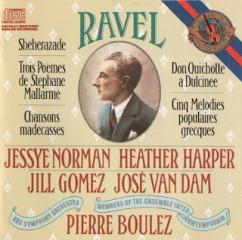Ravel - Songs with orchestra (Boulez) [1984]
Ravel - Songs with orchestra (Boulez) [1984]

Sheherazade 1 Asie 2 La Flûte Enchantée 3 L'Indifférent Trois Poémes De Stephane Mallarme 4 Soupir 5 Placet Futile 6 Surgi De La Croupe Et Du Bond Chansons Madecasses 7 Nahandove 8 Aoua! 9 Il Est Doux Don Quichotte À Dulcinée 10 Chanson Romanesque 11 Chanson Épique 12 Chanson À Boire Cinq Mélodies Populaires Grèques 13 Le Réveil De La Mariée 14 Là-Bas Vers L'Église 15 Quel Galant! 16 Chansons Des Cueilleuses De Lentisques 17 Tout Gai! Heather Harper – soprano (1-3) Jill Gomez – soprano (4-6) José Van Dam – baritone (10-17) David Butt – flute (1-3) Alain Marion – flute (7-9) Philippe Muller – cello (7-9) Pierre-Laurent Aimard – piano (7-9) B.B.C. Symphony Orchestra Pierre Boulez - conductor
This thoroughly recommendable issue is most welcome on CD, where its appreciable attributes can be even more clearly heard. Each singer has been carefully chosen for his or her task, and the contrast in timbres is, for the most part, illuminating. My single reservation concerns Heather Harper whom I now find a little cool for Sheherazade, in spite of the obvious distinction of her phrasing, but then this cycle isn't that well suited to Boulez's talents for stereoscopic precision and minute calculation. The other three singers have hardly been bettered as interpreters of their songs, and Boulez and his BBC and Parisian colleagues play throughout with delicacy combined with pinpoint accuracy. The recordings, made at different times in the 1970s and 1980s, are finely balanced. So I am as enthusiastic about the disc as I was back in 1984, if not more so. -- Gramophone [4/1987], arkivmusic.com
Pierre Boulez was a French composer, conductor, writer and pianist and is one of the leading and most influential composers and thinkers of his generation. He was born in Montbrison, Loire, France on 26th March 1925 and began piano lessons as a child, showing ability in both music and mathematics early on. After briefly studying the latter in Lyon, Boulez attended the Paris Conservatoire and studied with Olivier Messiaen and Andrée Vaurabourg (wife of Arthur Honegger). Messiaen introduced Boulez to twelve-tone technique and using this Boulez began to compose atonally in a post-Webernian style. His works and writings pushed the previous boundaries of abstraction and experimentation to new levels.
After taking his serialist ideas to their absolute limit in Structures, book I for two pianos, among other works, Boulez received much criticism about the work. Boulez felt that the language was limited in its expressive capability and that combined with the negative reception led Boulez to rethink his compositional language. The music that followed was less strict in its serialism but more gesture based and expressively flexible. The first particularly ground-breaking work in this new style was Le marteau sans maître (The Hammer without a Master) for ensemble and voice.
Following this work, Boulez became much more experimental, working with improvisatory music and leaving aspects of the music such as the ordering of movements or sections of pieces to be chosen by the performer on the night of a performance; this was likely influenced by Karlheinz Stockhausen’s ideas of polyvalent form and aleatoric (chance) music. Boulez has also had a significant career as a conductor, having conducted a large range of world-class ensembles.
He died on 5 January 2016, at his home in Baden-Baden, at the age of 90. He had been ill for some time and had been unable to take part in the many celebrations, held across the world, for his 90th birthday.
download (mp3 @320 kbs):
oboom yandex 4shared mega mediafire zalivalka cloudmailru uplea








